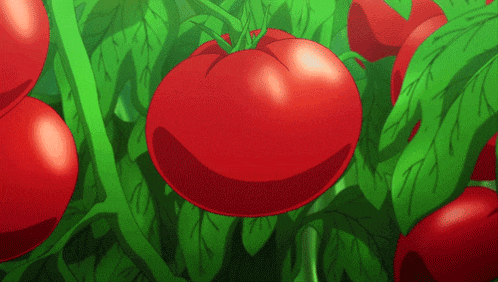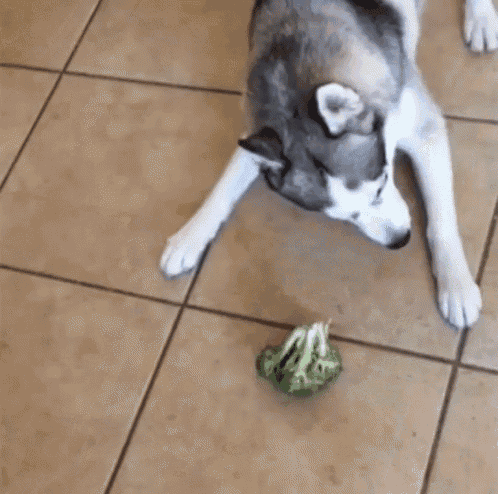
VERSIÓN ESPAÑOL:
¿Cómo va la gente de Blurt?
Les aúllo el chisme por el que seguro vienen a leer a mi cueva de meditación:
Desde bien chamaco mis padres me enseñaron a comer vegetales. Ellos no tenían la técnica de esconder o camuflar en otros productos más atractivos lo que consideraban nutritivo porque si yo no comía, en mi casa había la llamada "psicología de la chancla voladora" y uno, cual Matrix, tenía el deber moral de esquivarla.

Tampoco es que me torturaban si no quería comer coliflores porque las odiaba y creo que las odio hasta ahora (aunque a mis hijos a mi esposa les fascinan en ensalada, gratinadas y hasta en como suscedáneo del arroz), pero mis viejos me concientizaron en que cada producto que ellos ponían en el plato y el vaso implicaba un desgaste para el bolsillo, pero también para las manos que preparaban todo, al punto de darle un decorado a la mesa con un mantel hecho con diseños de la cultura prehispánica (herencia del lado materno) y con un florero lleno de plantas sintéticas (herencia de mis abuelos paternos)... Así que estaba prohibido tirar los platos de la mesa mientras los berrinches hacían de las suyas.

Los vegetales que mis padres me daban hasta tatemados en un comal en el que también preparaban las tortillas de maíz azul tenían un sabor especial, sabían delicioso. Sí, por las manos de mi mamá era así hasta cuando hacía los encurtidos y escabeches con chile habanero y bastantes julianas de cebollas rojas, pero a veces yo comía crudos los jitomates, las zanahorias, las calabacitas, o los pepinos sin ponerles siquiera una pizca de sal y tenían un sabor a orgánico, a bendición de lo que la tierra quería regalarnos.

Fuimos con mi esposa a realizar las compras en el mercado local y ella escogió unos jitomates que se veían exquisitos, confiamos y pensamos que serían orgánicos, que no tendrían tantos pesticidas como los que se comercializan a veces en el supermercado, en donde les ponen hasta cera a ciertos productos para que se vean más atractivos, pero el momento de partirlos tienen incluso gusanos que se han convertido en moho. Regresamos a la casa y al lavar las frutas y verduras porque mi hijo menor nos pidió un tomate crudo, el momento que lo mordió, le dio una o dos mordidas y lo escupió porque según dijo, tenía un sabor horrible... era eso o ponerse a jugar con los vegetales en vez de comérselos.

Él tiende a ser exagerado, pero ante su mamá no puede hacer drama, así que ella agarró el pedazo de tomate que el niño dejó encima de la mesa y lo mordió... era verdad lo que nuestro cachorro dijo, ¡ese jitomate tenía un olor fuerte a desinfectante, lo que trajo que el gusto se altere y nos produzca un sabor desagradable a cloro en la lengua! Pensamos que solo podría ser ese, pero no, todos estaban así, con ese olor horrible al abrirlos, aparte de que en el centro tenían un centro blanco. No es la primera vez que ocurre, en México también nos pasaba y llegamos a la conclusión de que, aunque la Tierra todavía siga produciendo para el ser humano, está enferma debido al uso indiscriminado de pesticidas hasta en los productos que en las etiquetas dice que son orgánicos.
Entiendo que se necesite proteger las plantas de plagas invasoras que llegan a dañar los sembríos, pero las empresas productoras de este tipo de productos alimenticios están abusando enormemente, a la par de que los costos de los vegetales suben demasiado. No existe una solución rápida, aunque la típica respuesta sí: "ten tus propios cultivos y convierte tu casa en un invernadero autosustentable", pues mala idea no es, solo que no todos tenemos el tiempo, la infraestructura y la experiencia en el área.
Aunque las acciones no sean inmediatas, los gobiernos deberían comenzar a implementar algún tipo de estrategia que les permita controlar este problema, pero no lo harán, lo sé, no lo harán con la excusa de que la densidad de población y explotación demográfica se ha elevado por lo tanto, debido a las necesidades de la gente se deben sobre explotar la tierra para que dé más de su capacidad.
Los vegetales han sido siempre un regalo de la tierra, una manifestación pura de la conexión entre el ser humano y la naturaleza, pero en la búsqueda de abundancia, apariencia impecable y productividad masiva, se ha intervenido este vínculo con el uso indiscriminado de agroquímicos y el resultado es un conflicto entre lo que creen ganar y lo que realmente pierden.
El sabor de un vegetal crecido en condiciones naturales es difícil de describir con justicia, es un sabor auténtico, a menudo complejo, que guarda la esencia de la tierra y el sol, sin embargo, en los productos que llegan a las estanterías de los supermercados (y ahora incluso de pequeños productores), este sabor parece haberse diluido. Jitomates perfectos por fuera, pero sin la intensidad de un tomate madurado al sol; zanahorias brillantes, pero sin esa dulzura característica que recuerda al cuidado con que fueron cultivadas, es como si en el proceso de intentar perfeccionarlos visualmente, se hubiesen olvidado que su verdadero valor está en su esencia, no en su apariencia.
El impacto ambiental es, quizá, la parte más alarmante. Los agroquímicos no solo se quedan en los campos, así que los suelos, antes ricos en biodiversidad, se vuelven áridos, desprovistos de microorganismos vitales. El agua, fuente de vida, se contamina con residuos químicos que viajan lejos, alcanzando ríos, lagos y hasta mares... Y el ciclo se repite al contaminar y afectar a todos los seres vivos, rompiendo cadenas alimenticias, alterando ecosistemas, poniendo en peligro la vida silvestre e incluso nuestra propia supervivencia.
Y luego está nuestra salud porque la exposición a residuos químicos en los alimentos puede no ser evidente de inmediato, pero los efectos acumulativos son difíciles de ignorar. Alergias, problemas hormonales, trastornos metabólicos... la lista que parece crecer conforme la ciencia avanza en sus investigaciones, por eso consumir alimentos tratados con estos químicos es como caminar en un campo minado: no se sabe cuándo o cómo puede aparecer el daño, pero la amenaza está ahí, latente incluso a través de alertas enviadas por la OMS.
Y están los que se aprovechan de esto con el slogan que se debe consumir productos libres de pesticidas para subir los precios de tal manera que no todos se pueden permitir en sus presupuestos familiares. ¿Es este el valor que debemos pagar por vegetales más grandes y brillantes? ¿Por mantener la velocidad de un sistema que parece ir en contra del ritmo natural de la tierra?
Quizá el verdadero cambio esté en reconsiderar nuestras elecciones siendo conscientes de que en cada bocado que damos estamos tomando decisiones sobre el futuro de nuestro planeta y nuestra salud.
Ya los leo más tarde.
Chau.
ENGLISH VERSION:
How's it going, Blurt folks?
I am telling you the gossip that you are surely coming to read in my meditation cave:
Since I was a little boy, my parents taught me to eat vegetables. They did not have the technique of hiding or camouflaging what they considered nutritious in other more attractive products because if I did not eat, in my house there was the so-called "flying flip-flop psychology" and one, like Matrix, had the moral duty to avoid it.

It's not that they tortured me if I didn't want to eat cauliflower because I hated it and I think I still hate it (although my children and my wife love it in salads, gratins and even as a substitute for rice), but my parents made me aware that every product they put on the plate and the glass implied an expense for the pocket, but also for the hands that prepared everything, to the point of decorating the table with a tablecloth made with designs from pre-Hispanic culture (inherited from my mother's side) and with a vase full of synthetic plants (inherited from my paternal grandparents)... So it was forbidden to throw the plates off the table while the tantrums were having their way.

The vegetables my parents gave me, even when roasted on a griddle where they also prepared blue corn tortillas, had a special flavor, they tasted delicious. Yes, it was like that with my mother's hands even when she made pickles and marinades with habanero chili and lots of julienned red onions, but sometimes I ate raw tomatoes, carrots, zucchini, or cucumbers without even adding a pinch of salt and they had an organic flavor, a blessing from what the earth wanted to give us.

My wife and I went shopping at the local market and she picked out some tomatoes that looked delicious. We trusted them and thought they were organic, that they didn't have as many pesticides as those sometimes sold in the supermarket, where they even put wax on certain products to make them look more attractive, but when you cut them they even have worms that have turned into mold. We returned home and when we washed the fruits and vegetables because my youngest son asked us for a raw tomato, the moment he bit into it, he took one or two bites and spit it out because, according to him, it tasted horrible... it was that or start playing with the vegetables instead of eating them.

He tends to be exaggerated, but he can't be dramatic in front of his mother, so she grabbed the piece of tomato that the boy left on the table and bit into it... it was true what our puppy said, that tomato had a strong disinfectant smell, which altered our taste and gave us an unpleasant chlorine taste on our tongue! We thought it could only be that one, but no, they were all like that, with that horrible smell when we opened them, apart from the fact that they had a white center in the middle. It's not the first time this has happened, it happened to us in Mexico too and we came to the conclusion that, although the Earth still continues to produce for humans, it is sick due to the indiscriminate use of pesticides, even in products that say they are organic on the labels.
I understand that plants need to be protected from invasive pests that damage crops, but companies producing these types of food products are abusing enormously, while the costs of vegetables are rising too much. There is no quick solution, although the typical answer is: "have your own crops and turn your house into a self-sustaining greenhouse", well it is not a bad idea, it's just that not all of us have the time, the infrastructure and the experience in the area.
Although the actions are not immediate, governments should begin to implement some kind of strategy that allows them to control this problem, but they will not do it, I know, they will not do it with the excuse that population density and demographic exploitation have increased, therefore, due to the needs of the people, they must overexploit the land so that it gives more than its capacity.
Vegetables have always been a gift from the earth, a pure manifestation of the connection between man and nature, but in the search for abundance, impeccable appearance and massive productivity, this link has been interfered with by the indiscriminate use of agrochemicals and the result is a conflict between what they think they gain and what they really lose.
The flavour of a vegetable grown in natural conditions is difficult to describe with justice, it is an authentic flavour, often complex, that retains the essence of the earth and the sun, however, in the products that reach the shelves of supermarkets (and now even from small producers), this flavour seems to have been diluted. Tomatoes that are perfect on the outside, but without the intensity of a sun-ripened tomato; bright carrots, but without that characteristic sweetness that reminds us of the care with which they were grown, it is as if in the process of trying to perfect them visually, they have forgotten that their true value is in their essence, not in their appearance.
The environmental impact is perhaps the most alarming part. Agrochemicals don't just stay in the fields, so soils, once rich in biodiversity, become arid, devoid of vital microorganisms. Water, the source of life, is contaminated by chemical residues that travel far, reaching rivers, lakes and even seas... And the cycle repeats itself by contaminating and affecting all living beings, breaking food chains, altering ecosystems, endangering wildlife and even our own survival.
And then there is our health because exposure to chemical residues in food may not be immediately evident, but the cumulative effects are difficult to ignore. Allergies, hormonal problems, metabolic disorders... the list seems to grow as science advances in its research, so consuming foods treated with these chemicals is like walking in a minefield: it is not known when or how the damage may appear, but the threat is there, latent even through alerts sent by the WHO.
And there are those who take advantage of this with the slogan that we should consume pesticide-free products to raise prices to a level that not everyone can afford in their family budgets. Is this the price we should pay for bigger and brighter vegetables? To keep up with the speed of a system that seems to go against the natural rhythm of the earth?
Perhaps the real change lies in reconsidering our choices, being aware that with every bite we take we are making decisions about the future of our planet and our health.
I'll read them later.
Bye.

¿Cómo vas, lobo?
Primero, antes de comenzar, quiero decirte que me reí un montón con algunos de los gifs que publicaste, estuvieron magníficos jajaja
Ahora sí... ¿sabes, lobo?, acá en mi país pasa exactamente lo mismo, algunas patatas que compras vienen con partes verdes, partes moradas, partes blancas en el centro y saben horrible, no sirven. Eso del tomate con olor a cloro o a desinfectante es cierto, ni idea qué pesticidas les pondrán, pero poco a poco se nota que quieren acabar con la población mundial porque algunos alimentos que llevan la etiqueta de natural, en realidad sufren procesos agresivos desde la siembra, y ni hablar de las carnes.
Más fácil saldría tener una su propia huerta que las autoridades movilizarse para realizar algo de provecho por los ciudadanos, es una pena, pero es la realidad que tenemos y la parte que nos compete es ser selectivos hasta con los pequeños agricultores que, quieran o no, para ver crecer la producción de sus terrenos, deben recurrir a la indiscriminación de pesticidas, los cuales, nos afectan gota a gota cada día.
Gracias por la publicación, lobo. Saludos a tu esposa y a tus hijos. Que tengan un buen fin de semana y que Dios los bendiga grandemente 🤗🤗